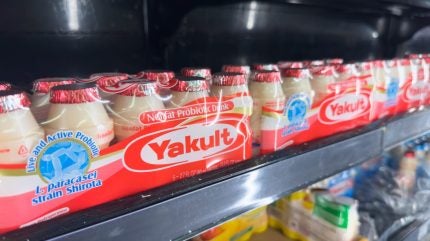
Yakult Honsha has set up a European R&D unit in the Netherlands as a “global hub for food innovation”.
The new centre sits within the company’s corporate facility on Wageningen Campus in Gelderland and has been established with a €3.7m ($4.3m) investment, the Japan-headquartered business said in a statement. The R&D unit was officially founded on 19 September.

Discover B2B Marketing That Performs
Combine business intelligence and editorial excellence to reach engaged professionals across 36 leading media platforms.
“In recent years, attending to diverse consumer needs and regulatory requirements in each country has become increasingly important,” Yakult said in the statement from company president Hiroshi Narita.
“By establishing an R&D centre outside of Japan, we aim to create a global hub for food innovation that contributes to health and wellbeing.”
Yakult added that “establishing an R&D centre on Wageningen Campus – originated around Wageningen University & Research, a world-renowned research institution in life sciences – is a rare and valuable opportunity”.
The company continued: “This initiative will not only enhance our product development capabilities but also enable us to explore new seeds of value creation that will drive future business growth. Through this global R&D framework, we aim to evolve into a truly global enterprise.”
In Europe, Yakult products are manufactured in countries including the Netherlands, Belgium, UK, Germany, Austria and Italy.

US Tariffs are shifting - will you react or anticipate?
Don’t let policy changes catch you off guard. Stay proactive with real-time data and expert analysis.
By GlobalDataEarlier this week, Yakult said it will establish a branch in Austria that will merge with, and absorb, Yakult Oesterreich in the same country, a wholly owned subsidiary within its European operations. The move is expected on 1 October.
Last year, Yakult closed a factory in China as part of changes to try to make its local business more competitive.
Yakult’s net sales for the 2024 fiscal year dropped 0.7% to Y499.6bn ($3.3bn).
Operating profit was also down in the 12 months to 31 March 2025. It fell 12.6% to Y55.3bn.
Meanwhile, profit attributable to owners of the parent company declined 10.7% to Y45.5bn.
It was a similar picture for the first quarter of the new financial year.
Those results, issued in July, showed net sales dropped 4.9% to Y116.6bn. Operating profit slumped 32.2% to Y10.9bn. Profits to the owners fell 17.7% to Y11.6bn.





